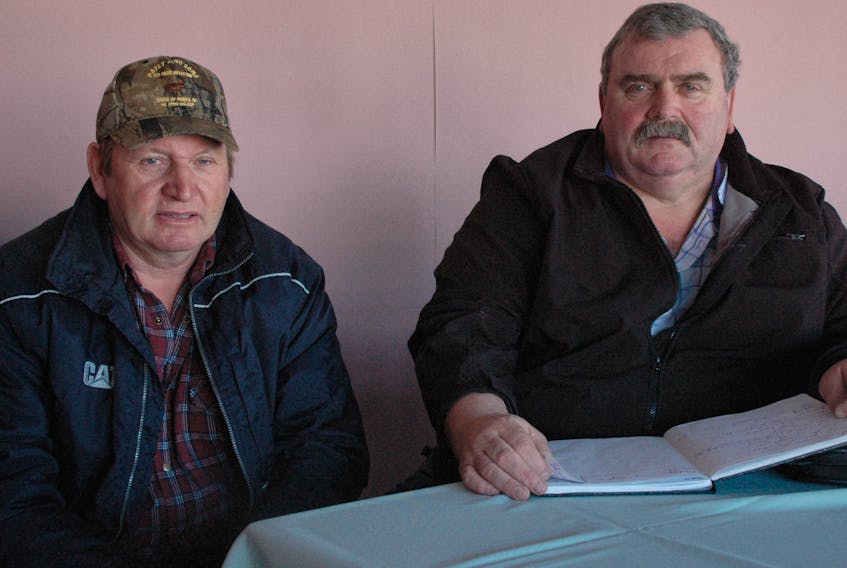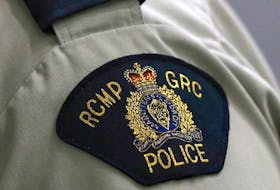GREAT NORTHERN PENINSULA, NL – The North of Fifty-Thirty Association (NOFTA) is working to identify issues and solutions for the fishery on the Great Northern Peninsula.
Over the past couple of years, enterprises in the region have been hit by shrimp quota cuts, seen capelin seemingly disappear and, most recently, received word of a drop in northern cod stocks.
Feeling the pressure, NOFTA’s members want to see some management changes so their communities can survive.
NOFTA is a non-profit organization comprised entirely of fishers from communities on the Great Northern Peninsula, from River of Ponds up to the tip of the peninsula and to Englee on the northeast side.
This year, its membership sits at over 300 members for 2018, with nine on NOFTA’s board of directors.
Since 2003, NOFTA has administered a northern shrimp allocation to the small boat inshore fishers of this area, which includes two shrimp fishing zones – 4R and 3K.
Near the start of the fishing season, NOFTA evenly redistributes the revenue generated by selling its allocation to the highest bidder to its entire membership.
“(NOFTA) is by the fishermen, for the fishermen and they’re the ones that’s going to benefit,” chairman Eric Patey, a fisher from River of Ponds, told the Northern Pen.
Fishers have the option to spend the extra money allocated however they deem necessary to get their operations up and running.
Typically, it’s around $2,000 per fisher each year.
However, cuts in the northern shrimp quotas over the past two years – including cuts to NOFTA’s allocation – are making it more difficult for fishers in these communities to sustain their livelihoods.
According to Patey and NOFTA coordinator Jerome Ward, the fishery is the foundation of these local economies, and changes have to be made in the way the fishery is managed for these small fishing communities on the Great Northern Peninsula to survive.
“We want people to understand we can’t continue on going the way we’re going, because there’ll be no communities left,” Ward told the Northern Pen. “Our livelihood is in the fishery and the forestry. And we have to build and stabilize our economy around those two resources.”
Ward was hired as coordinator for NOFTA in October 2017. Since then, he has identified a number of areas for improvement in the fishery through consultations with NOFTA membership.
On March 27, Ward and Patey sat down with the Northern Pen to discuss some of the issues.
Difficulty for young people entering fishery
Patey wants to see a plan that will allow more young people to enter the fishery.
He feels current policies make it too difficult for them to work in the industry, and he paints a dire picture of what will happen as the current generation approaches retirement and the next isn’t there to replace them.
“The way it is set up now with (the Department of Fisheries and Oceans), it’s not easy for young people to get into the fishery,” he said. “If young people don’t get into it … the licenses are just going to by the wayside and all our communities are going to go by the wayside.”
Ronald Patey, 63, is an Englee fisherman who represents the Main Brook-Englee sub-region on the NOFTA board. He spoke with the Northern Pen by phone.
He says his son Bradley tried to enter the industry, but government’s policies have kept him out.
Bradley has to work as a crewman full-time for five years, making only $10,000-$15,000 a year, to qualify for a core license.
To work a full-time job outside of the fishery would disqualify him immediately.
“The way it is now, a man can be an astronaut before he can be a fisherman,” Bradley said in the Jan 17, 2018 edition of the Northern Pen.
Ronald worries about the future as well.
“We’re not going nowhere, not for a few years yet,” he said. “But we haven’t got no one coming up behind us to take it over.”
He figures in the next five years, most of the current fishers in towns like Englee and Conche, will be retiring.
“There is a livelihood in the fishery for young people, but we have to find a way to get them in,” said Ward. “And the way the set-up is right now is just not working.”
More processing plants
Ward says fishers have been telling him they want more processing on the Great Northern Peninsula.
They feel there aren’t enough processing plants to handle their supply of fish.
Ward says NOFTA’s membership believes it may be a good idea to start up more small plants in the region as opposed to larger, corporate-owned plants.
He cites small plants in Main Brook and Conche as two examples.
“NOFTA doesn’t want to see a plant in every community anymore but they do want to see a few more licenses on the peninsula,” he said. “And their belief is, if there’s a local person who owns it, they’ll put more into it and will be here year after year – not a big corporation because they’re all about the bottom line and their shareholders.”
Fishers also believe local processing will improve the quality of the product and, therefore, the market value.
No buddy-up system in 3K
Ward and Patey point out that in 4R, groundfish enterprises are allowed to buddy-up but 3K fishers are not.
For instance, if three fishers are together on a boat, two of them will have to downgrade to smaller boats less suitable to catch the fish and, in turn, downgrading the quality.
Ward and Patey say NOFTA members in 3K want the buddy-up system enacted where multiple licenses can work together aboard a single vessel.
Other issues
In his dealing with fishers, Ward has also identified other issues. NOFTA members feel the seal hunt needs to be opened up more given the high seal population. Members also don’t want to wait three to four days before getting a price on their fish, and say they need more ice to preserve the quality of the fish while they wait for their prices and try to find buyers to process the fish.
And in 3K, they feel more fish needs to caught in August and September, instead of October and November, as weather conditions are more suitable during those months.
What needs to be done
Ward says to achieve what they desire, different groups, including the Department of Fisheries and Oceans (DFO), the Atlantic Canada Opportunities Agency (ACOA) and the province’s Department of Fisheries and Aquaculture (DFA) have to work together with NOFTA to reconsider the policies for the area.
“Different entities that have to come on board and say, ‘do the policies we have in place today, does this reflect what we want to do north of fifty-thirty?’ And right now, they don’t,” said Ward.
Meanwhile, Patey says NOFTA will continue to operate in the best interests of the fishers of the north of fifty-thirty region.
“Everything NOFTA stands for is for the members,” he said. “And we’re going to do what we can to help our communities and help our members to survive.”









